Integer vs. Double: What's the Difference?
Edited by Aimie Carlson || By Janet White || Published on January 14, 2024
An integer is a whole number without a fractional part, while a double represents a number with decimal points, allowing for fractional values.

Key Differences
Integers are numerical values without decimal points, representing whole numbers either positive or negative, including zero. Conversely, a double is a data type in programming that represents floating-point numbers, capable of storing large numbers with fractional parts. This distinction highlights the precision and range differences between these two numerical representations.
In terms of memory usage, an integer typically requires less storage space compared to a double. This is because integers represent a narrower range of values, whereas doubles, with their ability to hold decimals, need more memory to maintain precision. In programming, choosing between an integer and a double often depends on the nature of the data being handled.
When performing arithmetic operations, integers and doubles behave differently. Calculations with integers result in whole numbers, whereas operations with doubles can produce results with decimal points. This difference is crucial in programming and mathematical computations where precision is key.
In many programming languages, the concept of type conversion is essential when dealing with integers and doubles. An integer can be converted to a double, usually without loss of information, while converting a double to an integer involves truncating the decimal part, which can lead to loss of precision.
The representation of integers and doubles in different programming languages varies in terms of their range and precision. For instance, in some languages, an integer might be limited to a certain range of values, while a double can represent much larger or smaller numbers, albeit with a risk of precision loss for very large values.
ADVERTISEMENT
Comparison Chart
Type
Whole number without fractional parts
Number with decimal points
Memory Usage
Generally requires less memory
Requires more memory for precision
Arithmetic Behavior
Results in whole numbers
Can produce results with decimal points
Conversion
Can be converted to double without loss
Conversion to integer truncates decimals
Range and Precision
Limited range, no decimal precision
Larger range, includes decimal precision
ADVERTISEMENT
Integer and Double Definitions
Integer
A whole number in mathematics, either positive, negative, or zero.
Zero is an integer that represents neither a positive nor a negative value.
Double
A term indicating twice the amount or size.
She ordered a double espresso for an extra caffeine boost.
Integer
A numerical value representing whole numbers.
The number of students in a class is an integer.
Double
To multiply by two or increase twofold.
The company aims to double its profits this year.
Integer
An arithmetic concept representing non-fractional numbers.
The integer 7 is a prime number.
Double
In programming, a data type for floating-point numbers.
The variable 'pi' is stored as a double for precision.
Integer
A data type in programming for numbers without fractions.
The loop iterates 10 times, as indicated by the integer counter.
Double
A term used in sports for a hit that allows the batter to reach second base.
He hit a double in the last inning of the game.
Integer
A basic unit in number theory representing discrete values.
The series of integers is infinite in both positive and negative directions.
Double
A trick or deceptive act; duplicity.
The spy used a double to mislead his pursuers.
Integer
A member of the set of positive whole numbers {1, 2, 3, ... }, negative whole numbers {-1, -2, -3, ... }, and zero {0}.
Double
Twice as much in size, strength, number, or amount
A double dose.
Integer
A complete unit or entity.
Double
Composed of two like parts
Double doors.
Integer
(arithmetic) A number that is not a fraction; an element of the infinite and numerable set {..., -3, -2, -1, 0, 1, 2, 3, ...}.
Integer
A complete entity; a whole number, in contradistinction to a fraction or a mixed number.
Integer
Any of the natural numbers (positive or negative) or zero
FAQs
What is an integer?
An integer is a whole number without fractional parts.
What is a double in programming?
A double is a data type for floating-point numbers with decimal points.
Is an integer precise?
Yes, integers are precise as they represent exact whole numbers.
Can doubles store very large numbers?
Yes, doubles can store large numbers but with varying precision.
Can a double represent fractional values?
Yes, doubles are designed to represent numbers with fractions.
Is zero considered an integer?
Yes, zero is an integer.
Can an integer be negative?
Yes, integers can be positive, negative, or zero.
Can a double have a decimal point even if it represents a whole number?
Yes, a double can represent whole numbers with a decimal point.
Do integers support decimal arithmetic operations?
No, integers are used for whole number arithmetic.
Do integers take up less memory than doubles?
Generally, yes, integers require less memory than doubles.
What happens when a double is converted to an integer?
The fractional part is truncated, potentially leading to precision loss.
Can the range of an integer vary in different programming languages?
Yes, the range of integers can vary based on the language and system.
Are integers used in loops in programming?
Yes, integers are commonly used as counters in loops.
Are integers suitable for counting discrete items?
Yes, integers are ideal for counting discrete items.
What is an example of a double in everyday life?
Measurements like 1.5 meters are examples of doubles.
Can doubles lose precision in certain calculations?
Yes, doubles can lose precision especially with very large numbers.
Is it possible to add an integer and a double?
Yes, but the result is typically a double.
Is the concept of integers fundamental in mathematics?
Yes, integers are a fundamental concept in number theory.
Are doubles used in financial calculations?
Yes, doubles are often used in financial calculations for precision.
Are integers and doubles interchangeable in programming?
Not always, as their usage depends on the required precision and range.
About Author
Written by
Janet WhiteJanet White has been an esteemed writer and blogger for Difference Wiki. Holding a Master's degree in Science and Medical Journalism from the prestigious Boston University, she has consistently demonstrated her expertise and passion for her field. When she's not immersed in her work, Janet relishes her time exercising, delving into a good book, and cherishing moments with friends and family.
Edited by
Aimie CarlsonAimie Carlson, holding a master's degree in English literature, is a fervent English language enthusiast. She lends her writing talents to Difference Wiki, a prominent website that specializes in comparisons, offering readers insightful analyses that both captivate and inform.






































































